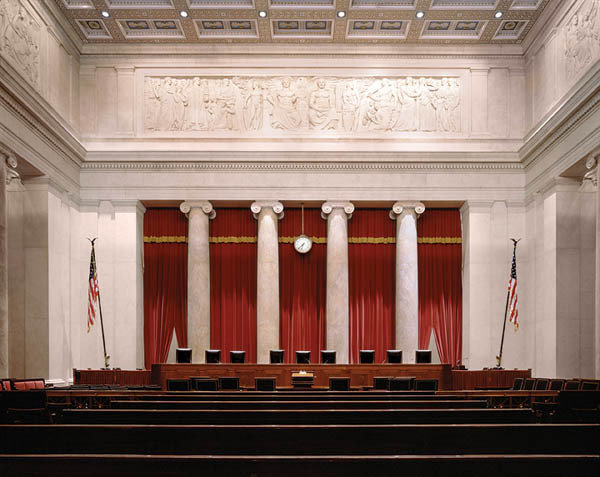Last week, a 6-3 Supreme Court said the First Amendment allows a business offering “expressive” services to discriminate based on the owner’s religious beliefs.
 State public accommodations laws are anti-discrimination laws that regulate businesses choosing to sell goods or services to the general public. Last week, a 6-3 Supreme Court said the First Amendment allows a business offering “expressive” services to discriminate based on the owner’s religious beliefs. How can that be right?
State public accommodations laws are anti-discrimination laws that regulate businesses choosing to sell goods or services to the general public. Last week, a 6-3 Supreme Court said the First Amendment allows a business offering “expressive” services to discriminate based on the owner’s religious beliefs. How can that be right?
The Colorado business owner in 303 Creative v. Elenis was a website designer who wanted to expand her services to include wedding websites. She did not want to offer those websites to same-sex couples because of her religious belief that same-sex marriages are “false.”
In her petition to the high court, the website designer, Lorie Smith, said it would violate her sincerely held religious beliefs to create a wedding website for a same-sex wedding because, by doing so, she would be expressing a message celebrating and promoting a conception of marriage that she believes is contrary to God’s design.
More than 20 states have laws like the one in Colorado that bar discrimination because of disability, race, creed, color, sexual orientation, gender identity, marital status, national origin or ancestry in a place of public accommodation. Indeed, these laws have been enacted at all levels of government.
As Justice Sonia Sotomayor explained in her dissent:
“A public accommodations law does not force anyone to start a business, or to hold out the business’s goods or services to the public at large. The law also does not compel any business to sell any particular good or service. But if a business chooses to profit from the public market, which is established and maintained by the state, the state may require the business to abide by a legal norm of nondiscrimination.
“The concept of a public accommodation law thus embodies a simple, but powerful, social contract: A business that chooses to sell to the public assumes a duty to serve the public without unjust discrimination.”
However, Justice Neil Gorsuch, author of the majority opinion, said that when a public accommodation law conflicts with the First Amendment’s free speech clause, the First Amendment trumps that law.
At the core of the dispute between the majority and the dissenting justices were dramatically different views of how public accommodations laws operate in situations like the web designer’s challenge.
For Gorsuch, the Colorado law was unconstitutionally compelling speech by the website designer.
“In this case, Colorado seeks to force an individual to speak in ways that align with its views but defy her conscience about a matter of major significance. The First Amendment envisions the United States as a rich and complex place where all persons are free to think and speak as they wish, not as the government demands,” wrote Gorsuch.
No, responded Sotomayor, who was joined by Justices Elena Kagan and Ketanji Brown Jackson. The state’s law was not compelling or regulating speech at all. It was regulating conduct.
“Under state law, the business is free to include, or not to include, any lawful message it wants in its wedding websites. The only thing the business may not do is deny whatever websites it offers on the basis of sexual orientation. This Court, however, grants the business a broad exemption from state law and allows the business to post a notice that says: Wedding websites will be refused to gays and lesbians.”
The refusal to deal with or to serve a class of people, she added, “is not an expressive interest protected by the First Amendment.”
And the dueling opinions offer hypothetical examples of the consequences of their opponents’ arguments.
Justice Gorsuch says that under Colorado’s approach, the government could force “all manner of artists, speechwriters, and others whose services involve speech to speak what they do not believe on pain of penalty. The government could require ‘an unwilling Muslim movie director to make a film with a Zionist message,’ or ‘an atheist muralist to accept a commission celebrating Evangelical zeal,’ so long as they would make films or murals for other members of the public with different messages. Equally, the government could force a male website designer married to another man to design websites for an organization that advocates against same-sex marriage.”
Justice Sotomayor counters, “The decision threatens to balkanize the market and to allow the exclusion of other groups from many services. A website designer could equally refuse to create a wedding website for an interracial couple, for example. How quickly we forget that opposition to interracial marriage was often because ‘Almighty God . . . did not intend for the races to mix.’ Yet the reason for discrimination need not even be religious, as this case arises under the Free Speech Clause. A stationer could refuse to sell a birth announcement for a disabled couple because she opposes their having a child. A large retail store could reserve its family portrait services for ‘traditional’ families. And so on.”
In the end, Justice Gorsuch reiterated that the court’s decision was about “expressive conduct.” But, as many court scholars and others have already noted, he did not define “expressive conduct” with particularity, and that leaves open much difficult line-drawing for lower courts in future challenges to public accommodations laws.
Marcia Coyle is a regular contributor to Constitution Daily and PBS NewsHour. She was the Chief Washington Correspondent for The National Law Journal, covering the Supreme Court for more than 30 years.







